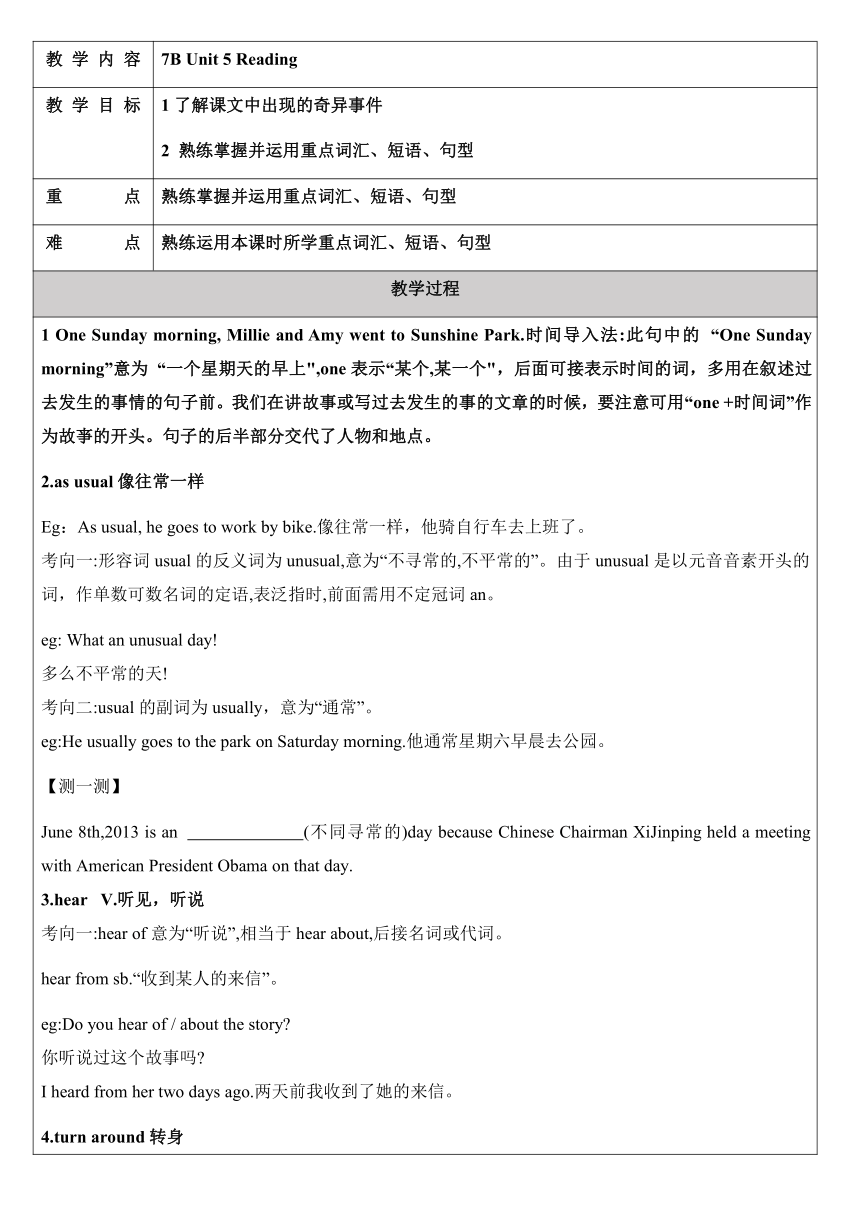
教 学 内 容 7B Unit 5 Reading 教 学 目 标 1了解课文中出现的奇异事件 2 熟练掌握并运用重点词汇、短语、句型 重 点 熟练掌握并运用重点词汇、短语、句型 难 点 熟练运用本课时所学重点词汇、短语、句型 教学过程 1 One Sunday morning, Millie and Amy went to Sunshine Park.时间导入法:此句中的 “One Sunday morning”意为 “一个星期天的早上",one表示“某个,某一个",后面可接表示时间的词,多用在叙述过去发生的事情的句子前。我们在讲故事或写过去发生的事的文章的时候,要注意可用“one +时间词”作为故亊的开头。句子的后半部分交代了人物和地点。 2.as usual像往常一样 Eg:As usual, he goes to work by bike.像往常一样,他骑自行车去上班了。 考向一:形容词usual的反义词为unusual,意为“不寻常的,不平常的”。由于unusual是以元音音素开头的词,作单数可数名词的定语,表泛指时,前面需用不定冠词an。 eg: What an unusual day! 多么不平常的天! 考向二:usual的副词为usually,意为“通常”。 eg:He usually goes to the park on Saturday morning.他通常星期六早晨去公园。 【测一测】 June 8th,2013 is an (不同寻常的)day because Chinese Chairman XiJinping held a meeting with American President Obama on that day. 3.hear V.听见,听说 考向一:hear of意为“听说”,相当于hear about,后接名词或代词。 hear from sb.“收到某人的来信”。 eg:Do you hear of / about the story 你听说过这个故事吗 I heard from her two days ago.两天前我收到了她的来信。 4.turn around转身 eg: Turn around and let me look at your back. 转过去,让我看看你的后背。 考向:turn around意为“转过身”,表示将身体转向 和原来朝向相反的位置,但是没有走动; turn back意为“原路返回,往回走”,表示先转身,然后往回走了-段距离。 动词词组tum around中around为副词,也可用turn round。 拓展与turn相关的短语: turn on打开(水、电等);turn off关闭(水、电等);tum up调大声音;tum down调小声音 【测一测】 一Could you the computer for me, dear I want to check my e-mails. 一Certainly, I’ll do it right away. A turn on B turn down C turn off D turn up 5.reply v回着,答复 e;:She didn't know how to reply她不知道要 怎样回答。 考向:[辨析]reply与answer answer多用于“回答问题(answer the question)”或者“接电话(answer the telephone)”Can you answer my question 你能回答我的问题吗 reply比answer正式,一般指经过思考有针对性的回答。reply 作不及物动词使用时,不能直接接宾语,要加to,即 reply to = answer。He never replied to any of my letters.他从来没给我回过信。 【一语辨异】 We are very busy. We have to not only answer the calls, but also reply to the letters.我们非常忙碌。我们不仅要接电话,还得回信。 6.strange adj.奇怪的 eg:His idea is strange.他的想法是奇怪的。 考向一:strange作形容词,还可意为“陌生的;生疏的;不熟悉的”。 eg: When he woke up, he found himself in a strange place. 他醒来时,发现自己在一个陌生的地方。 考向二:stranger意为“陌生人”。 eg:Are you afraid of strangers 你害怕陌生人吗 【测一测】 The boys heard the (奇怪的)noise. 7.leave /li:v/ V.离开 ecg: When does the train leave 火车什么时候离开 一:[解析]leave与leave for leave +地点表示“离开某地”。He will leave Beijing tomorrow.他明天要离开北京。leave for+地点表示“前往+地点某地”。Sandy will leave for Beijing tonight. 桑迪今晚将前往北京。 二: ... ...
~~ 您好,已阅读到文档的结尾了 ~~